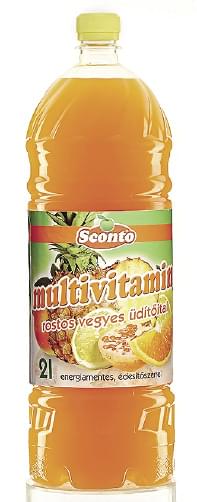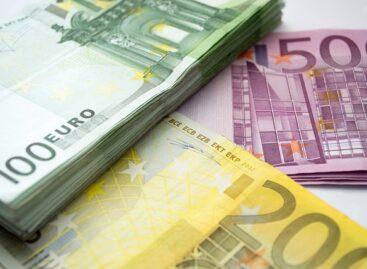Magazine: PET bottle caught up with carton among fruit juices
Just like in previous years, the fruit juice market was contracting last year and so far 2013 doesn’t look good either.
 Balázs Bogár, junior trade marketing manager with Sió Eckes Kft. told our magazine that elevating ingredient and packaging material prices, plus the introduction of the public health product fee (NETA) all left their mark on the market. Consumers have become more price-sensitive, which polarised sales further: sales of fruit drinks with low fruit content dropped by the average decline of the fruit juice market, fruit juice sales worsened below the level of the average and nectar sales declined above the average. According to Melinda Kun, brand manager of RAUCH Hungária Kft. two thirds of the market is made up by fruit drinks, fruit juices represent nearly one third and nectars only have a small proportion. Hungarians typically prefer products with lower fruit content. Packaging-wise the share of PET bottles has been growing for years. 2012 was the first year when more products were sold in PET bottle than in carton packaging. In terms of value drink cartons are still leading because the majority of 100-percent juices and market leading Sió products are available in cartons. Vilmos Várkonyi, group brand manager of Maspex Olympos Kft. informed Trade magazin that private label products still realise nearly one third of total sales and added that it is still hypermarkets that sell the most fruit juice. Andrea Olaszi, director of commerce at Szobi Italgyártó Kft. told that Hungarian-owned chains had started to play a more important role than before; at the same time discounters’ market share reduced. János Gréczi, the owner of Gramex 2000 Kft. reckons that family-size products with low fruit content keep conquering. The company had a good year last year and managed to improve volume sales in terms of both the PL products that they manufacture and their own brands. This July Coca-Cola Hungary put Cappy Pulpy (in orange flavour, in two sizes) on the market. We learned from Éda Pogány, communications director of Coca-Cola Hungary that this product creates a new category in the Hungarian market: it is a fruit drink but contains added fruit pulp, thanks to which Cappy Pulpy combines the characteristics of all three fruit juice categories. In April 2013 Sió added the Peach-Orange, Sour Cherry-Apple-Plum and Multivitamin varieties to its classic portfolio and in just 2 months they carved out a 2-percent market share. The company’s goal is to offer a wide range of flavours in the 25-percent fruit juice category too. This year Sió installs more than 200 durable wood displays in stores. Maspex Olympos offers new products in the ice tea category: the new Olympos Ice Tea appears in stores in lemon and peach flavours, in 1.5l PET bottles. Sales of KUBU, the company’s brand for children, are also shifting from pulpy nectars to lighter products such as Kubu Play or even flavoured water Kubu Waterrr. This trend isn’t really price-induced, it is the result of children’s changing preference. RAUCH managed to strengthen its positions on a contracting market, improving sales by 1.4 percent in volume and by 1.3 percent in value (from April 2011-May 2012 to April 2012-May 2013). High fruit content Happy Day products are now available in 19 flavours. Bravo and Limessa are present in lower fruit content categories. RAUCH’s Yippy products were developed especially for children and they contain added vitamins and calcium; now they are also available in the popular 0.2l format with drinking straw. Gramex 2000 Kft.’s market strategy focuses on the maximum utilisation of its production capacity and on providing better service to partners. They can adapt to partner needs flexibly because they manufacture everything, from cheap products to preservative-free premium juices. Gramex plans to introduce a new product line in the near future. Pölöskei Szörp Kft. entered the international market with its PL fruit drinks this summer. Strategy director Károly Takács told Trade magazin that this move involved ten products. Pölöskei Szörp never ceases to innovate: recently they refurbished the look of their 0.5l and 1l drinks. Currently they are present in the market with 12- and 25-percent products, and they manufacture PL products with 50-percent fruit content. The company’s plans include the developing of a lemonade product line
Balázs Bogár, junior trade marketing manager with Sió Eckes Kft. told our magazine that elevating ingredient and packaging material prices, plus the introduction of the public health product fee (NETA) all left their mark on the market. Consumers have become more price-sensitive, which polarised sales further: sales of fruit drinks with low fruit content dropped by the average decline of the fruit juice market, fruit juice sales worsened below the level of the average and nectar sales declined above the average. According to Melinda Kun, brand manager of RAUCH Hungária Kft. two thirds of the market is made up by fruit drinks, fruit juices represent nearly one third and nectars only have a small proportion. Hungarians typically prefer products with lower fruit content. Packaging-wise the share of PET bottles has been growing for years. 2012 was the first year when more products were sold in PET bottle than in carton packaging. In terms of value drink cartons are still leading because the majority of 100-percent juices and market leading Sió products are available in cartons. Vilmos Várkonyi, group brand manager of Maspex Olympos Kft. informed Trade magazin that private label products still realise nearly one third of total sales and added that it is still hypermarkets that sell the most fruit juice. Andrea Olaszi, director of commerce at Szobi Italgyártó Kft. told that Hungarian-owned chains had started to play a more important role than before; at the same time discounters’ market share reduced. János Gréczi, the owner of Gramex 2000 Kft. reckons that family-size products with low fruit content keep conquering. The company had a good year last year and managed to improve volume sales in terms of both the PL products that they manufacture and their own brands. This July Coca-Cola Hungary put Cappy Pulpy (in orange flavour, in two sizes) on the market. We learned from Éda Pogány, communications director of Coca-Cola Hungary that this product creates a new category in the Hungarian market: it is a fruit drink but contains added fruit pulp, thanks to which Cappy Pulpy combines the characteristics of all three fruit juice categories. In April 2013 Sió added the Peach-Orange, Sour Cherry-Apple-Plum and Multivitamin varieties to its classic portfolio and in just 2 months they carved out a 2-percent market share. The company’s goal is to offer a wide range of flavours in the 25-percent fruit juice category too. This year Sió installs more than 200 durable wood displays in stores. Maspex Olympos offers new products in the ice tea category: the new Olympos Ice Tea appears in stores in lemon and peach flavours, in 1.5l PET bottles. Sales of KUBU, the company’s brand for children, are also shifting from pulpy nectars to lighter products such as Kubu Play or even flavoured water Kubu Waterrr. This trend isn’t really price-induced, it is the result of children’s changing preference. RAUCH managed to strengthen its positions on a contracting market, improving sales by 1.4 percent in volume and by 1.3 percent in value (from April 2011-May 2012 to April 2012-May 2013). High fruit content Happy Day products are now available in 19 flavours. Bravo and Limessa are present in lower fruit content categories. RAUCH’s Yippy products were developed especially for children and they contain added vitamins and calcium; now they are also available in the popular 0.2l format with drinking straw. Gramex 2000 Kft.’s market strategy focuses on the maximum utilisation of its production capacity and on providing better service to partners. They can adapt to partner needs flexibly because they manufacture everything, from cheap products to preservative-free premium juices. Gramex plans to introduce a new product line in the near future. Pölöskei Szörp Kft. entered the international market with its PL fruit drinks this summer. Strategy director Károly Takács told Trade magazin that this move involved ten products. Pölöskei Szörp never ceases to innovate: recently they refurbished the look of their 0.5l and 1l drinks. Currently they are present in the market with 12- and 25-percent products, and they manufacture PL products with 50-percent fruit content. The company’s plans include the developing of a lemonade product line
Related news
Related news
MBH quick analysis: Tourism will continue to soar this year
🎧 Hallgasd a cikket: Lejátszás Szünet Folytatás Leállítás Nyelv: Auto…
Read more >A stable compass in the Hungarian FMCG sector for 20 years
🎧 Hallgasd a cikket: Lejátszás Szünet Folytatás Leállítás Nyelv: Auto…
Read more >Half of employees do not support salary transparency
🎧 Hallgasd a cikket: Lejátszás Szünet Folytatás Leállítás Nyelv: Auto…
Read more >





